Hassani S. Mathematical Physics: A Modern Introduction to Its Foundations
Подождите немного. Документ загружается.

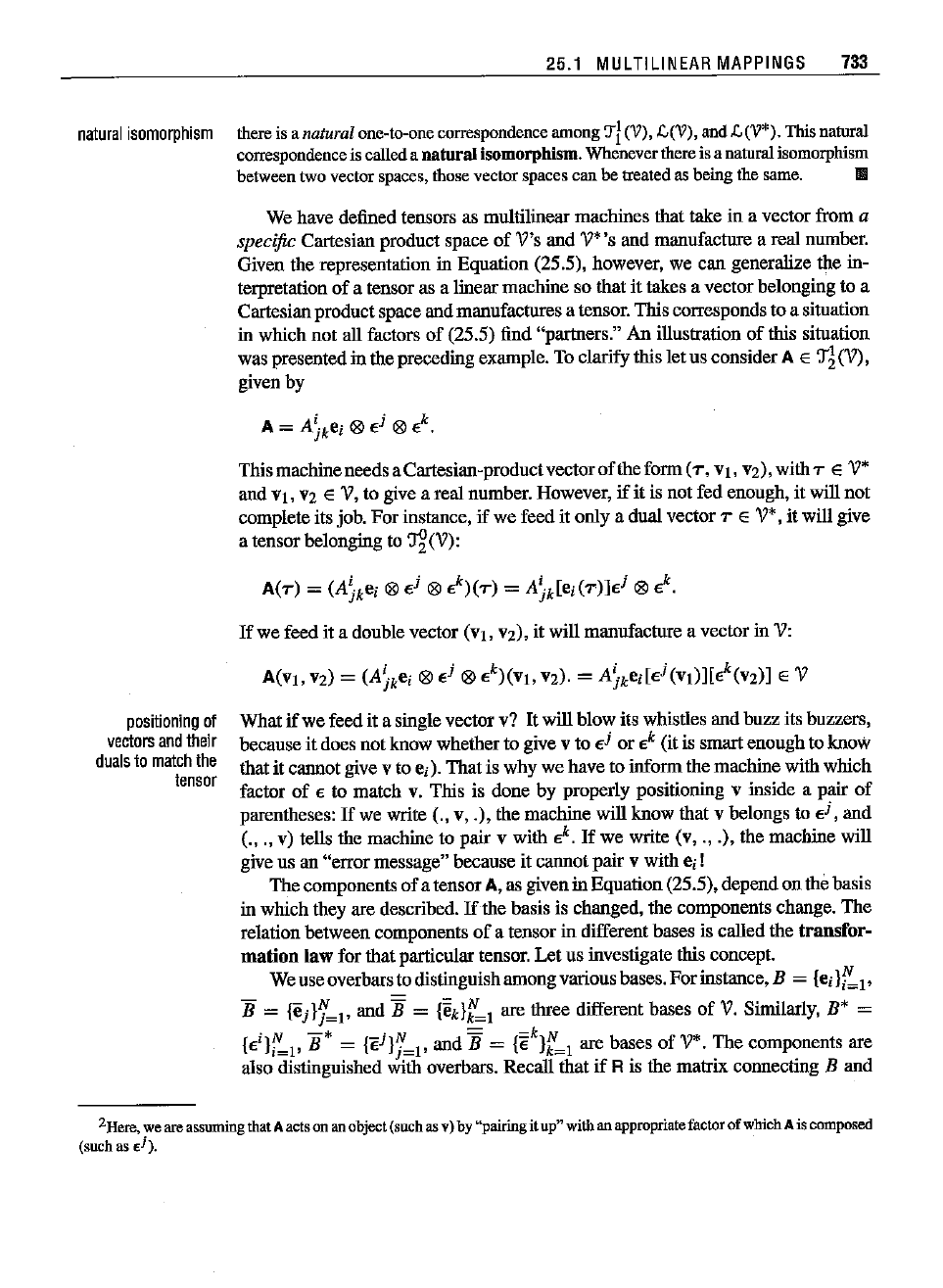
25.1 MULTILINEAR
MAPPINGS
733
natural
isomorphism
thereisa natural one-to-one correspondence among
TI
(V),C(V),andC(V*).Thisnatural
correspondence
iscalledanaturalisomorphism.
Whenever
there
isa
natural
isomorphism
between two vectorspaces,those vectorspaces canbe treatedas being thesame.
III
We have defined tensors as multilinear machines that take in a vector from a
specific Cartesian product space of V's and V*'s and manufacture a real number.
Given the representation in Equation (25.5), however, we can generalize the in-
terpretation of a tensor as a linear machine so that it takes a vector belonging to a
Cartesianproductspace and manufactures a tensor. This corresponds to a situation
in which not all factors of (25.5) find "partners."
An illustration of this situation
was presentedin the preceding example. To clarify this let us consider A
E
Ti
(V),
given by
A =
A~kei
<81
€i
<81
€k.
ThismachineneedsaCartesian-productvectoroftheform(T,
VI, V2), with-r E V*
and
VI, V2 E V, to give a real number. However,
if
it is not fed enough, it will not
complete its job.
For
instance,
if
we feed it ouly a dual vector T E V*,it will give
a tensor belonging
to
<Jg(V):
A(T) =
(A~kei
<81
€i
<81
€k)(T)
=
A~k[ei(T)]€i
<81
€k.
If
we feed it a double vector (VI, V2), it will manufacture a vector in V:
positioning
01
vectors
and
Iheir
duals
10
match
the
tensor
What
if
we feed it a singlevector v?
It
will blow its whistles and buzz its buzzers,
becauseit does not know whether to give v to
€i
or €k (it is smartenoughto know
that it cannot give v to e.), That is why we have to inform the machine with which
factor of
e to match v. This is done by properly positioning v inside a pair of
parentheses:
If
we write (, v, .), the machine will know that v belongs to
€i,
and
(.,
"v)
tells the machine to pair v with €k,
If
Wewrite
(v,.,
.), the machine will
giveus an
"error
message"
because
it
cannot
pair
v withej!
The components of a tensor A,as given in Equation(25.5), depend on the basis
in which they are described.
If
the basis is changed, the components change. The
relation between components
of
a tensor in different bases is called the
transfor-
mation
law
for that particular tensor,
Let
us investigate this concept.
Weuse overbars to distiognishamong various bases.
For
instance,B = Iei
J~I'
B = lei
Jf~l'
and B=
lijklf=1
are three different bases of V. Similarly, B* =
IdJ~l'
B* =
rEiJf=I'
and B=
l~kJf~1
are bases of V*. The components are
also distioguished with overbars. Recall that
if
R is the matrix connectiog B and
2Here,
weare
assuming
that
Aactsonanobject(suchasv)by
''pairing
itup"withan
appropriate
factor
of
which Ais composed
(suchas
~.i).
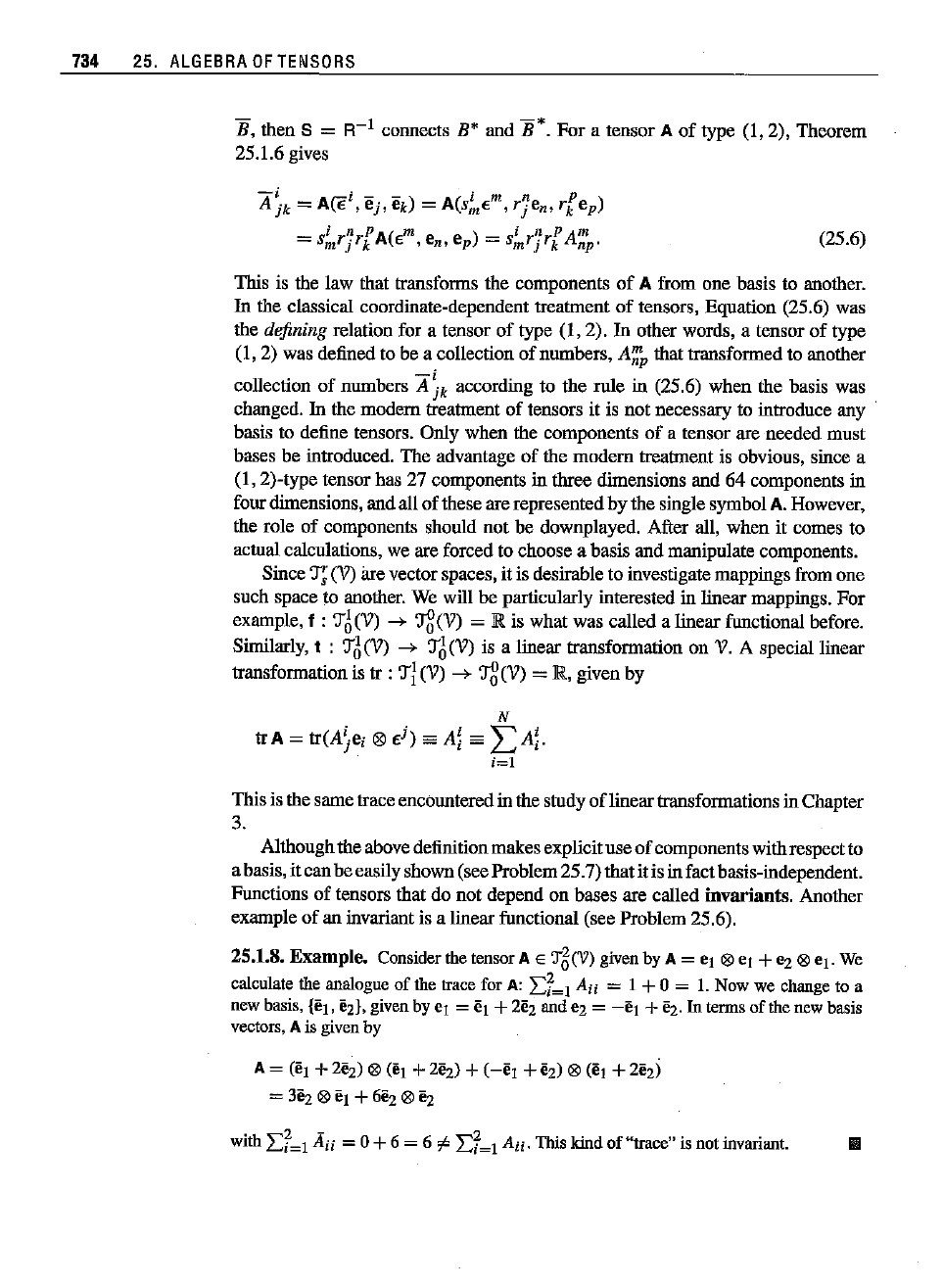
(25.6)
734 25.
ALGEBRA
OF
TENSORS
B, then S =
R-
I
connecls B* and B*. For a tensor A
of
type
(1,2),
Theorem
25.1.6 gives
-Ai
rxi
-
-)
A( i m n
p)
jk=A\€
,ej,ek
= Sm€
,Tjen,Tke
p
i n
PA(
m ) i n
PAm
=Smrjrk
e
,en,e
p
=SmTjTk
np :
This is the law that transforms the components
of
A from one basis to another.
In
the classical coordinate-dependent treatment
of
tensors, Eqnation (25.6) was
the
defining relation for a tensor of type
(1,2).
In
other words, a tensor of type
(1, 2) was defined to be a collection of nnmbers,
A;:'p
that transformed to another
collection of nnmbers
A~k
according to the mIe in (25.6) when the basis was
changed.
In
the modem treatment of tensors it is
not
necessary to introdnce any
basis to define tensors. Only when the components
of
a tensor are needed mnst
bases be introduced. The advantage of the
modem
treatment is obvious, since a
(1, 2)-type tensor has 27 components in three dimensions and 64 components in
four dimensions, and all of these are representedby the single symbol
A.However,
the role of components should not be downplayed. After all, when it comes to
actual calcnlations, we are forced to choose a basis and manipulate components.
Since
Y,(V) arevector spaces, it is desirable to investigate mappings from one
snch space
10another. We will be particularly interested in linear mappings. For
example, f :
~J(V)
--> 'Ji!(V) =
JR
is what was called a linear functional before.
Similarly, t :
~J(V)
-->
~J(V)
is a linear transformation on V. A special linear
transformation is tr :
~l
(V) --> 'Ji!(V) =
JR,
given by
N
tr A =
tr(A~ei
®
fj)
sa A: sa
~::.>:.
;=1
This is the same trace encounteredin the study
oflinear
transformations in Chapter
3.
Althoughthe above definition makes explicituse
of
componentswith respectto
abasis, itcan be easily shown (seeProblem25.7) that it is in fact basis-independent.
Functions of tensors that do not depend on bases are called invariants. Another
example of an invatiant is a linear functional (see Problem 25.6).
25.1.8. Example. Consider thetensorA E T5(V) givenby A=
"I
0
"I
+ "2 0
"I.
We
calculate
the
analogue
of the
trace
for A:
LT=l
A
ii
= 1 +0 = 1. Now we
change
to a
newbasis,{Cl,
ez}.
givenbyei = Cl+
2cz
ande2 =
-cl
+f2. In
terms
of the newbasis
vectors, Ais given by
A = (01
+2ez) 0 (01 +2ez) +
(-01
+02) 0 (01 +2°2)
=3°2001
+
6
°2 0 °2
with
L:T=l
Aii
= 0 +6 = 6
#:-
L:f=l
Aij. Thiskind
of
"trace" is not
invariant.
II
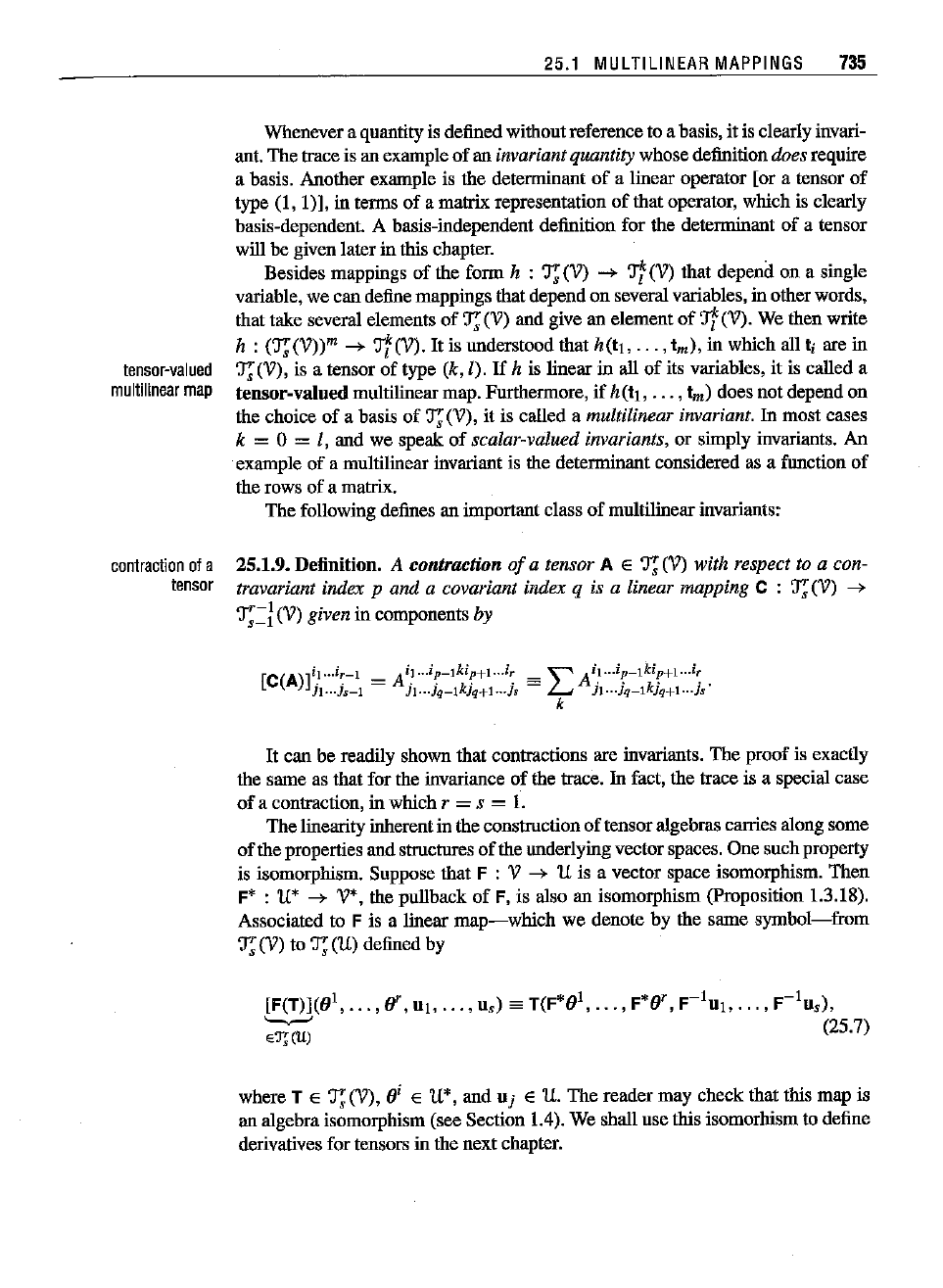
tensor-valued
multilinear
map
contraction
ofa
tensor
25.1 MULTILINEAR
MAPPINGS
735
Whenevera quantityis definedwithoutreference to a basis,it is clearlyinvari-
ant.
The
trace is an example
of
an invariant quantity whosedefinition does require
a basis. Another example is
the
determinant
of
a linear operator [or a tensor
of
type
(I,
1)], in terms
of
a matrix representation
of
that operator, which is clearly
basis-dependent. A basis-independent definition for the determinant
of
a tensor
will be given laterin this chapter.
Besides mappings
of
the
form
h :
'Y,
(V) ->-
'If
(V) that
depend
on a single
variable, we
can
define mappings thatdepend
on
several variables, in otherwords,
that take several elements
of
'Y,
(V) and give an
element
of
'Jj' (V). We then write
h : ('Y,(v))m ->- 'Jj'(V).
It
is understood that
h(tl,
...
,t
m
) ,
in which all ti are in
'Y,(V), is a tensor
of
type
(k,I).
If
h is linear in all
of
its variables, it is called a
tensor-valned
multilioear map. Furthermore,
if
h(tl,
...
,t
m
)
does
not
depend on
the choice
of
a basis
of
'Y,
(V), it is called a multilinear invariant.
In
most
cases
k = 0 = I, and we
speak
of
scalar-valued invariants, or siroply invariaots.
An
example
of
a multilinear invariant is the determinant considered as a function
of
the
rows
of
a matrix.
The
following defines an important class
of
multilinearinvariants:
25.1.9. Definition.
A contraction
of
a tensor A E
'Y,
(V) with respect to a con-
travariant index p and a covariant index q is a linear mapping
C :
'Y,
(V)
->-
'J;=!(V)
given in components by
It
can
be readily shown that contractions are invariants.
The
proof
is exactly
the
same
as that for the invariance
of
the trace.
In
fact, the trace is a special case
of a
contraction,
in whichr = s = 1.
The
linearity inherentin the construction
of
tensor
algebras carries along some
of
the properties
and
structures
of
the
underlyingvectorspaces.
One
suchproperty
is isomorphism. Suppose that F : V
->- U is a vector space isomorphism.
Then
F* : U* ->- V*, the pullback
of
F, is also an isomorphism (Proposition 1.3.18).
Associated to F is a linear
map-which
we denote by the
same
symbol-from
'Y,
(V) to
'Y,
(U) defined by
where T
E
'Y,
(V), (Ji E U*,
and
Uj E U.
The
reader
may
check
that tltis
map
is
an algebra isomorphism (see Section 1.4). We shall
use
tltis isomorhism to define
derivatives
for
tensors
in thenext
chapter.
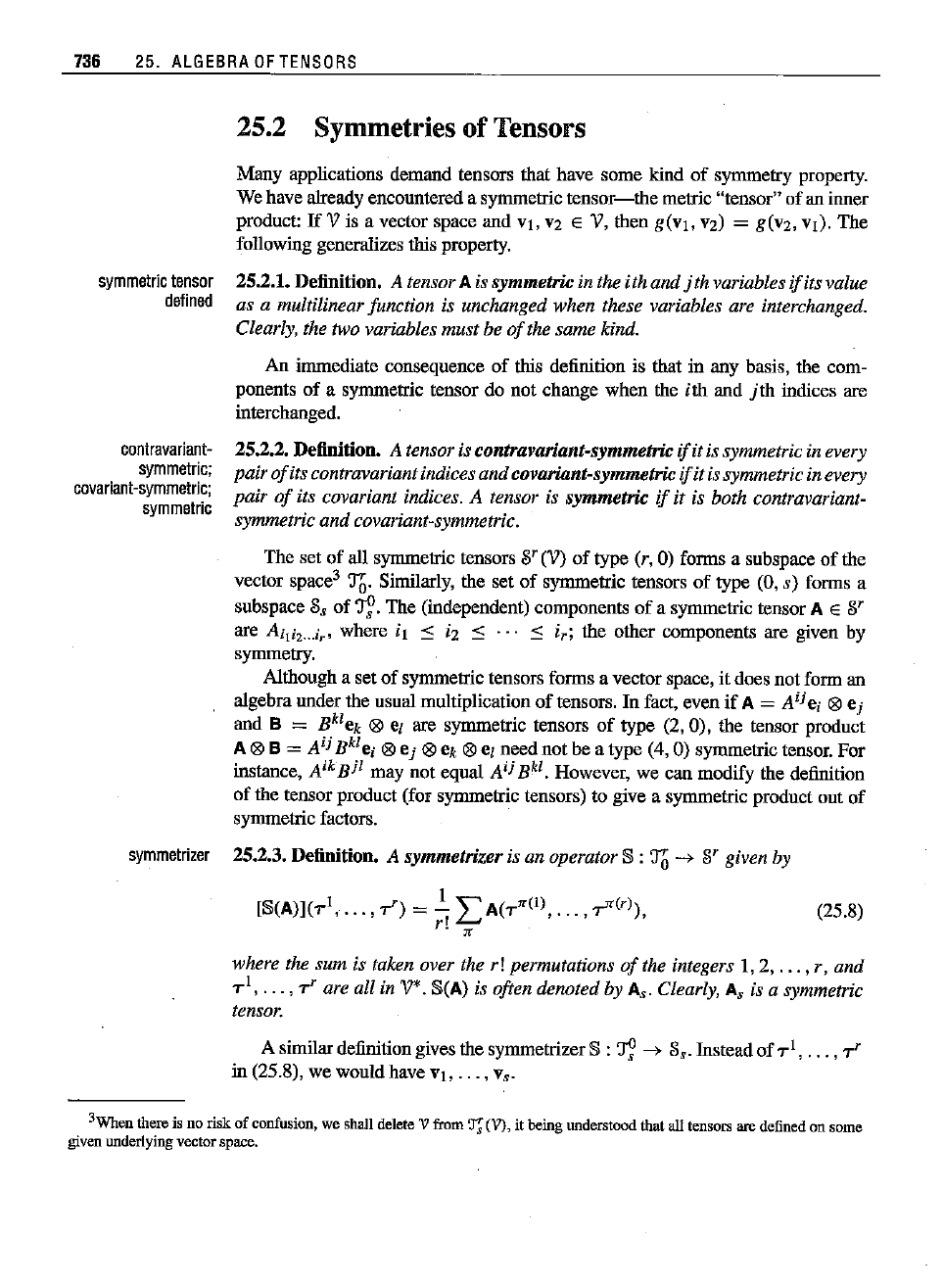
736 25.
ALGEBRA
OF
TENSORS
25.2 Symmetries of Tensors
symmetric
tensor
defined
contravariant-
symmetric;
covarlant-svrnmetrlc;
symmetric
Many applications demand tensors that have some kind
of
symmetry property.
We have already encountered a symmetric
tensor-the
metric "tensor"
of
an inner
product:
If
V is a vector space and VI, V2 E V, then
g(VI,
V2) =
g(V2,
VI).
The
following generalizes this property.
25.2.1. Definition.
A tensorAis symmetricin the ith
and
j th variablesifits value
as a multilinearfunction is unchanged
when
these variables are interchanged.
Clearly, the two variables
must
be
of
the
same
kind.
An
immediate consequence
of
this definition is that in any basis, the com-
ponents
of
a symmetric tensor do not change when the
ith
and
jth
indices are
interchanged.
25.2.2. Definition.
A tensor is contravariant-symmetricifit is symmetric in every
pair
of
itscontravariantindicesandcovariant-symmetricifitissymmetricinevery
pair
of
its covariant indices. A tensor is
symmetric
if it is both contravariant-
symmetric
and
covariant-symmetric.
The set
of
all symmetric tensors
S'
(V)
of
type
(r, 0) forms a subspace
of
the
vector space''
TQ.
Similarly, the set
of
symmetric tensors
of
type (0,
s)
forms a
subspace S,
of
'J;>.
The (independent) components
of
a symmetric tensor A E
S'
are Ailiz...ir. where
it
:::
iz
~
...
:::
i-;
the other components are given by
symmetry.
Although a set
of
symmetric tensors forms a vector space, it does not form an
algebra under the usual multiplication
of
tensors. In fact, even
if
A =
Aije,
@ej
and B = Rk1ek @ el are symmetric tensors
of
type
(2,0),
the tensor product
A@ B
=
Aij
Rkl
ei
@ej
@ek
@el
neednot be a type (4, 0) symmetric tensor. For
instance,
A
ik
s!' may not equal
Aij
R
k
l.
However, we can modify the definition
of
the tensor product (for symmetric tensors) to give a symmetric product out
of
symmetric factors.
symmetrizer
25.2.3. Definition. A
symmetrizer
is an operator § :
TQ
""*
S'
given by
(25.8)
where the sum is taken over the r! permutations
a/the
integers
1,2,
...
, r,
and
r
l
,
...
,
r'
are all in
V'.
§(A) is often denoted by A,. Clearly, A, is a symmetric
tensor.
A similar definition gives the symmetrizer§ :
'J;>
""*
S,.
Instead
of
r
l
,
...
,
r'
in (25.8), we would have
VI,
...
,
V,.
3When there is no risk of confusion, we shall delete V from
'.J;
(V), it being understood that all tensors are defined on some
givenunderlyingvectorspace.
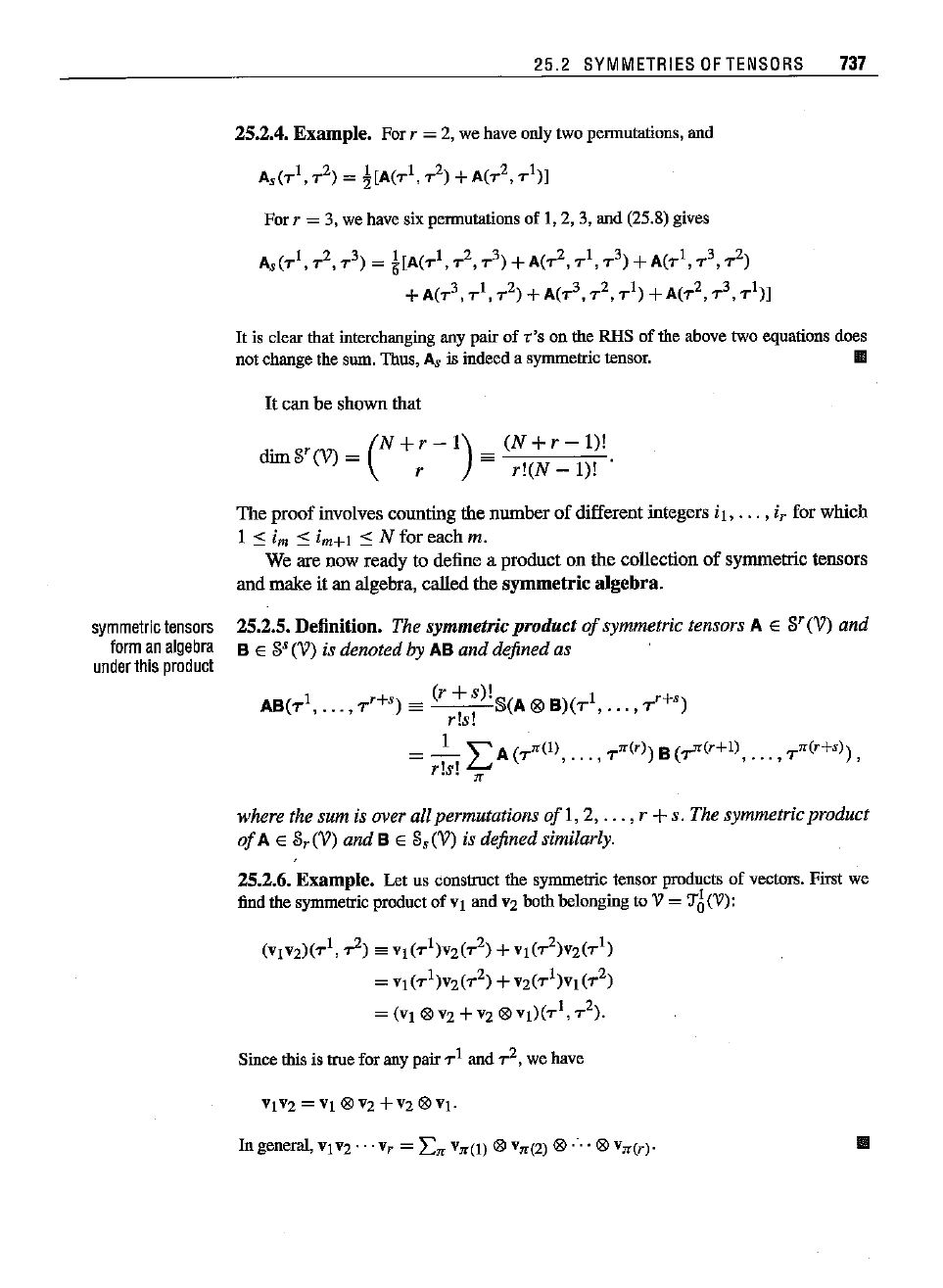
symmetric
tensors
form
an
algebra
under
this
product
25.2
SYMMETRIES
OF
TENSORS
737
25.2.4.
Example.
Forr = 2, wehave onlytwo permutations,and
Forr = 3, we havesix
permutations
of 1,2, 3, and(25.8)gives
As(r
I,
r
2
,
r
3
)
=
!lA(r
I,
r
2
,
r
3
)
+
A(r
2,
r
I,
r
3
)
+
A(r
I,
r
3
,
r
2
)
+
A(r
3,
r
I,
r
2
)
+
A(r
3,
r
2
,
r
I)
+
A(r
2,
r
3
,
rI)]
It
is clearthat
interchanging
anypairof
r's
on theRHSof the abovetwo
equations
does
notchange the sum. Thus,
As
is indeeda symmetric
tensor.
II
It
can be shown that
dimSr(V) =
(N
+r -
1)
sa
(N
+r
-1)1.
r
rl(N
-
1)1
The
proof
involves counting the number
of
different integers
iI,
...
,i; for which
1:::;
i
m
~
i
m
+ l
~
N for each m.
We are now ready to define a product on the collection
of
synnnetric tensors
and make it an algebra, called the
symmetric
algebra.
25.2.5. Definition. The symmetricproduct
of
symmetric tensors A E
sr
(V) and
B E
S'
(V) is denoted by AB and defined as
1 r+, _ (r +
s)!"
1 r+,
AB(T
,
...
,T)=
,,(A<8IB)(T ,
...
,T
)
rJs1
= _1_
LA
(T"(I),
...
, T,,(r») B (T"(r+I),
...
, T,,(r+,») ,
TIs!
1r
where the sum is over all permutations
of
1, 2,
...
, r +s. The symmetricproduct
of
A E s,(V)
and
B E S, (V) is defined similarly.
25.2.6. Example. Let us
construct
the
symmetric
tensor
products
of
vectors.
Firstwe
findthe symmetricproductof vj and v2 bothbelongingto V=
'J6
(V):
(VIV2)(rI,~)
==
VI
(rI)V2(~)
+ VI
(~)V2(rI)
= VI
(r
I)V2(T
2)
+V2(r
I)VI(T
2)
= (VI 0 v2 + v2 0
vI)(r
I,
r
2
).
Sincethisis
true
for
any
pair
T
1
andT
2,
wehave
In general, VI
vz
...
v
r
=
En
VJr(l) ® V
n(2)
® .'. . ® V
1r
(r) '
iii
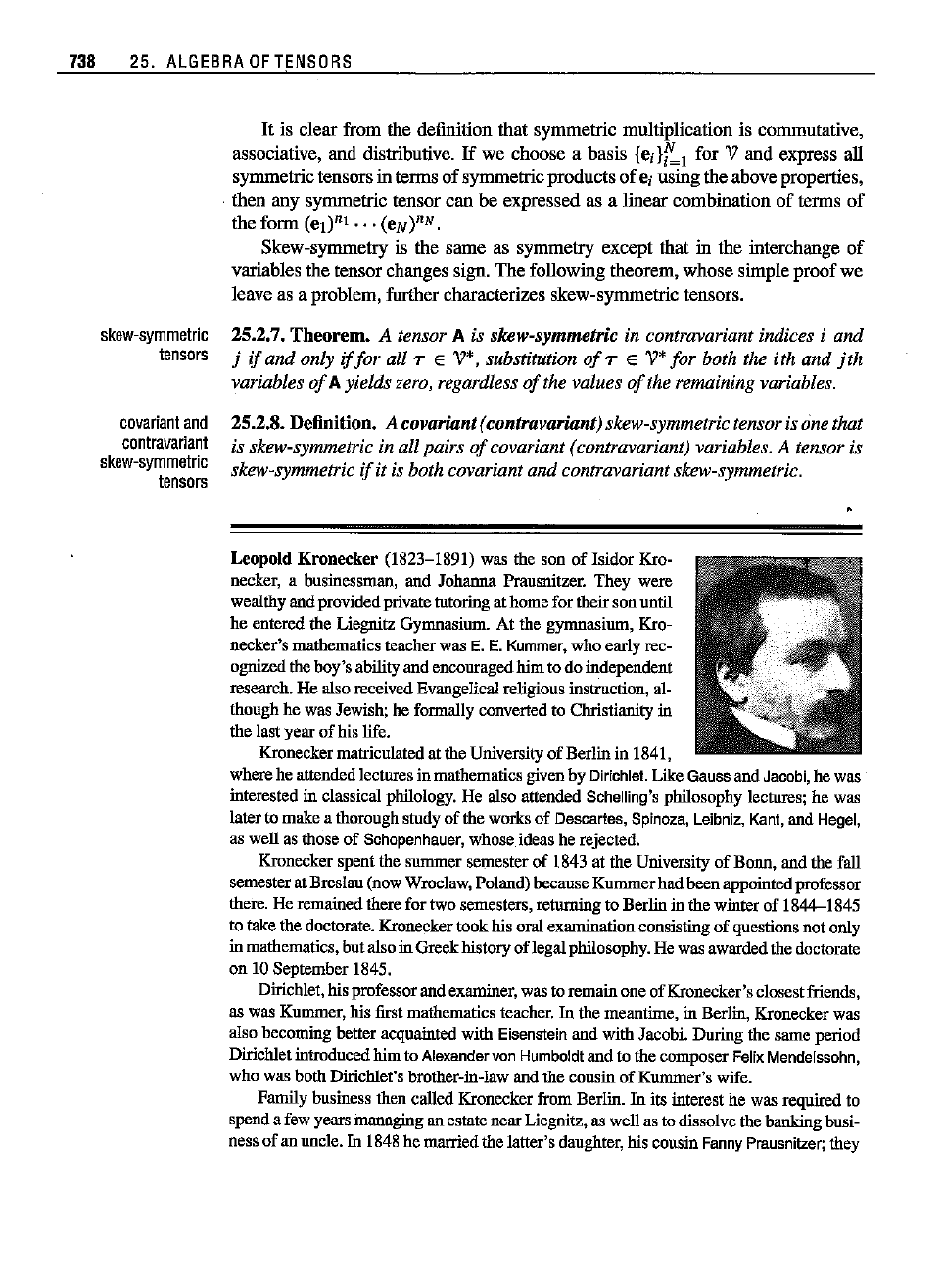
738
25.
ALGEBRA
OF
TENSORS
It
is clear from the definition that symmetric multiplication is commutative,
associative, and distributive.
If
we choose a basis {eilr:,l for V and express all
symmetrictensors in terms of symmetricproducts
of
ej using the above properties,
then any symmetric tensor can be expressed as a linear combination of terms of
the form
(ell
n l
•••
(eN
inN.
Skew-symmetry is the same as symmetry except that in the interchange of
variables the tensor changes sign. The following theorem, whose simple proofwe
leave as a problem, further characterizes skew-symmetric tensors.
skew-symmetric
tensors
covariant
and
contravariant
skew-symmetric
tensors
25.2.7.Theorem. A tensor A is skew-symmetric in contravariant indices i and
j ifand only if
for
all T E
V*,
substitution
of
T E
V*
for
both the ith
and
j th
variables
of
A yields zero, regardless
of
the values
of
the remaining variables.
25.2.8. Definition. A covariant(contravariant) skew-symmetrictensoris one that
is skew-symmetric in all pairs
of
covariant (contravariant) variables. A tensor is
skew-symmetric ifit is both covariant and contravariant skew-symmetric.
Leopold Kronecker (1823-1891) was the son of Isidor Kro-
necker,
a
businessman,
and
Johanna
Prausnitzer;: They were
wealthy
and
provided
private
tutoring
athomefor
their
sonuntil
he entered the Liegnitz Gymnasium. At the gymnasium, Kro-
necker's
mathematics
teacher
wasE.E.
Kummer,
whoearlyrec-
ognizedtheboy's
ability
and
encouraged
himtodo
independent
research.
Healso
received
Evangelical religious
instruction,
al-
though
he was
Jewish;
he
formally
converted
to
Christianity
in
thelastyearof hislife.
Kronecker
matriculated
attheUniversity of Berlinin 1841,
where
he
attended
lectures
in
mathematics
givenby
Dirichlet.
Like
Gauss
and
Jacobi,
hewas
interested
inclassicalphilology. He also
attended
Schelling's
philosophy
lectures;
he was
later
tomakea
thorough
studyof the
works
of
Descartes,
Spinoza,
Leibniz,
Kant,
and
Hegel,
aswell asthoseof
Schopenhauer,
whoseideashe
rejected.
Kronecker
spentthe
summer
semester
of 1843 attheUniversity of Bonn,andthefall
semester
at
Breslau
(now
Wroclaw,
Poland)
because
Kummer
hadbeen
appointed
professor
there.
He
remained
there
fortwosemesters,
returning
toBerlininthe
winter
of
1844--1845
to
take
the
doctorate.
Kronecker
tookhisoral
examination
consistingof
questions
notonly
in
mathematics,
butalsoin
Greek
history
of
legalphilosophy. Hewas
awarded
the
doctorate
on IOSeptember 1845.
Dirichlet,
his
professor
and
examiner,
wasto
remain
one
of
Kronecker'sclosest
friends,
aswas
Kummer,
his
first
mathematics
teacher.
In the
meantime,
in
Berlin,
Kronecker
was
alsobecoming
better
acquainted
with
Eisenstein
andwith
Jacobi.
During
thesame
period
Dirichlet
introduced
himto
Alexander
von
Humboldt
andtothe
composer
Felix
Mendelssohn,
whowasbothDirichlet's
brother-in-law
andthecousinof
Kummer's
wife.
Family
business
thencalled
Kronecker
from
Berlin.In its
interest
he was
required
to
spend
afewyears
managing
anestatenearLiegnitz, aswellastodissolvethe
banking
busi-
nessof anuncle.
In 1848he
married
the
latter's
daughter,
his cousin
Fanny
Prausnitzer;
they
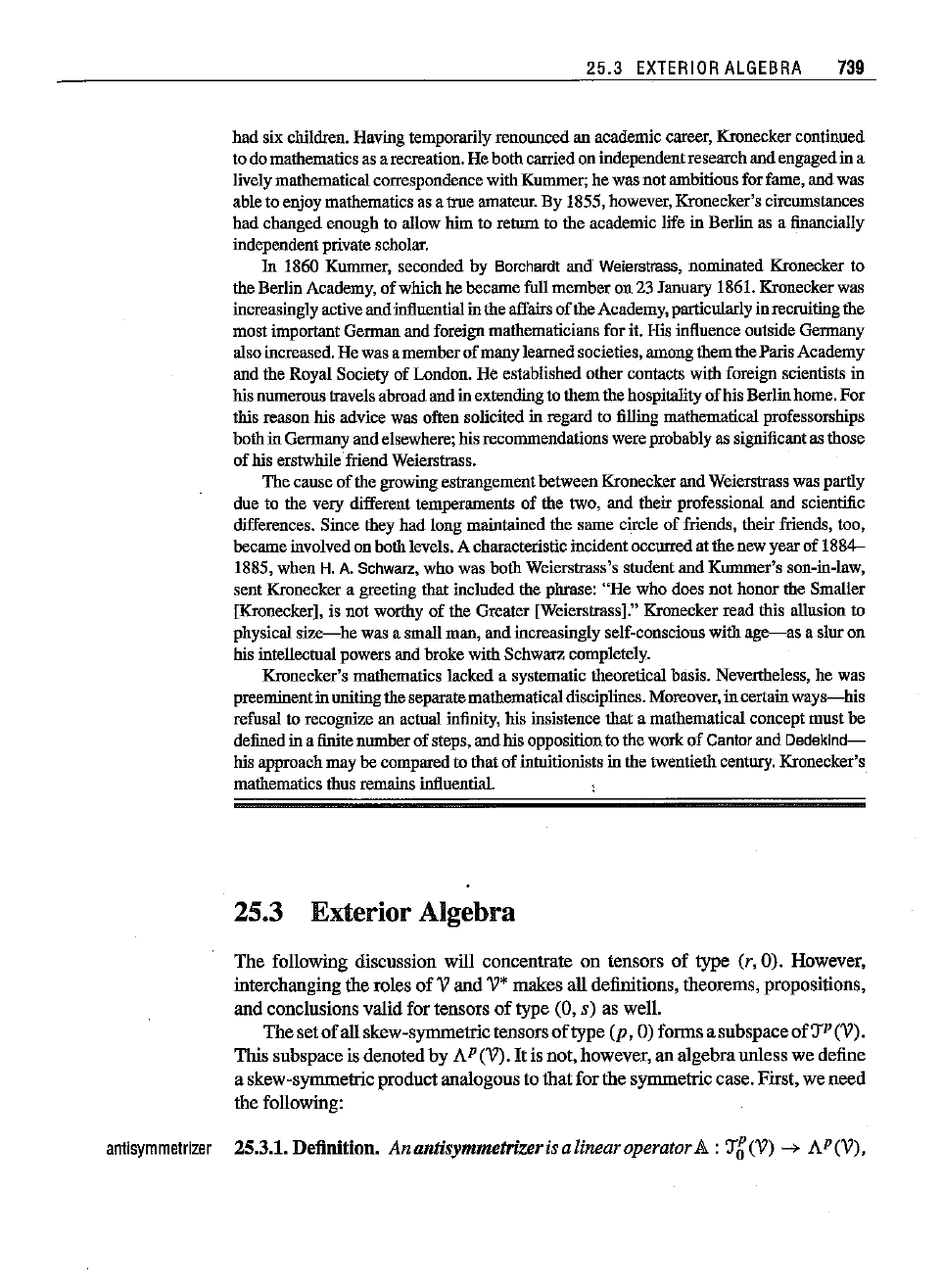
25.3
EXTERIOR
ALGEBRA
739
had sixchildren.Havingtemporarilyrenouncedan academiccareer,Kroneckercontinued
to do mathematicsas arecreation. He
both
carriedon independentresearch
and
engagedin a
livelymathematicalcorrespondence withKummer; he was
not
ambitious for fame,
and
was
ableto enjoymathematics asatrue amateur. By 1855,however, Kronecker'scircwnstances
had changed enough to allow him to return to the academic life in Berlin as a financially
independentprivate
scholar.
In
1860 Kummer, seconded by Borchardt
and
Weierstrass, nominated Kronecker to
the Berlin Academy, of
which
he
became
full
member
on 23 January 1861. Kronecker was
increasinglyactive and influential inthe affairs of theAcademy, particularly in recruiting the
most
important
German
and
foreign mathematicians for it. His influence outside Germany
also increased. He was a
member
of
many
learnedsocieties, among
them
the ParisAcademy
and the
Royal
Society of London. He established
other
contacts with foreign scientists in
hisnumerous travels abroadand in extendingto
them
the
hospitality
of
his Berlinhome.
For
this reason his advice was often solicited in regard to filling mathematical professorships
bothin Germany and elsewhere; his recommendations
were
probablyas significant as those
of
his erstwhile'friend Weierstrass.
The cause
of
the growing estrangement
between
Kronecker
and
Weierstrass was partly
due to the very different temperaments of the two,
and
their professional and scientific
differences. Since they
had
long maintained the
same
circle
of
friends, their friends, too,
became
involvedon bothlevels. A characteristic incidentoccurredat
the
new
year
of
1884-
1885,
when
H.A.
SChwarz,
who was
both
Weierstrass's student
and
Kummer's
son-in-law,
sent
Kronecker a greeting that included the phrase:
"He
who
does
not
honor
the Smaller
[Kronecker], is
not
worthy
of
the Greater [Weierstrass]." Kronecker read this allusion to
physical
size-he
was a small
man,
and
increasingly self-conscious
with
age-as
a sluron
his intellectual powers
and
broke
with
Schwarz completely.
Kronecker's mathematics lacked a systematic theoretical basis. Nevertheless, he was
preeminentin unitingthe separatemathematicaldisciplines. Moreover, in certain
ways-his
refusal to recognize an actual infinity, his insistence
that
a mathematical concept
must
be
definedin a finite number
of
steps,
and
his opposition to the
work
of
Cantor
and
Dedekind-
his approach
may
be compared to
that
of
intuitionists in the twentieth century. Kronecker's
mathematics thus remains influential.
25.3 Exterior Algebra
The following discussion will concentrate on tensors of type (r,0). However,
interchanging the roles of V and V* makes all definitions, theorems, propositions,
and conclusions valid for tensors
of
type (0, s) as well.
The set
of
all skew-symmetrictensors
oftype
(p,
0) forms asubspaceofTr'(V).
This subspace is denoted by
AP(V).
His
not, however, an algebra unless we define
a skew-symmetricproduct analogous 10 that for the symmetric case. First, we need
the following:
anlisymmelrizer
25.3.1. Definition. Anantisymmetrizerisalinearoperatoril.:
~C(V)
->
AP(V),
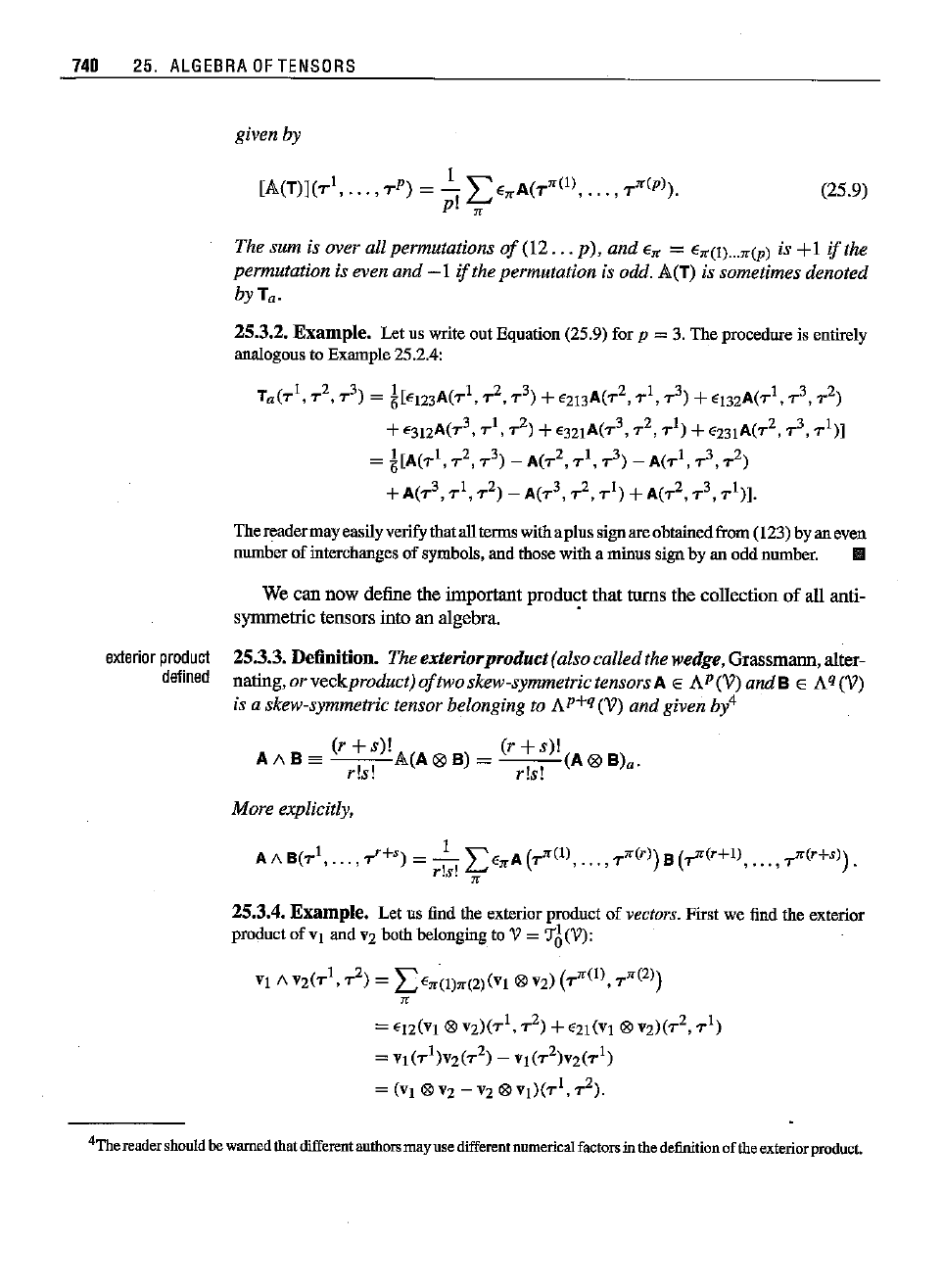
740 25.
ALGEBRA
OF
TENSORS
given by
(25.9)
The sum is over all permutations
oj
(12
...
pi,
and
E"
= E"CI)...
,,(p)
is +I if the
permutation is even
and
-I
ifthe permutation is odd. A(T) is sometimes denoted
byT
a.
25.3.2.
Example.
Letus write out Equation(25.9) for p = 3. The procedureis entirely
analogousto Example25.2.4:
T
a(7"I,
7"2, 7"3) =
~[€123A(7"I,
7"2, 7"3) +€213A(7"2, 7"1,7"3) +E132
A(7"I,
7"3,7"2)
+€312
A(7"3,
7"1,7"2) +€32I
A(7"3,
7"2, 7"1) +E23I
A(7"2,
7"3, 7"1)]
=
~[A(7"I,
7"2, 7"3) _ A(7"2, 7"1,7"3) _ A(7"I, 7"3,7"2)
+A(7"3, 7"1,7"2) _ A(7"3, 7"2, 7"1) + A(7"2, 7"3, 7"1)].
Thereadermay easilyverifythatall
terms
withaplussignareobtainedfrom (123)byaneven
number
of
interchanges
of symbols, andthosewitha
minus
signby anodd
number.
II
We can now define the important product that turns the collection
of
all anti-
symmetric tensors into an algebra. .
exterior
product
25.3.3. Definition. The exteriorproduct(also calledthe wedge, Grassmann, alter-
defined
nating,or veckproduct)oJtwoskew-symmetrictensors A E
AP(V)andB
E
Aq(V)
is a skew-symmetric tensor belonging to Ap+q
(V)
and given
bl
A
/\
B es
(r
+s)!
A(A
® B) =
(r
+s)! (A ® B)a.
r!s! r!s!
More explicitly,
25.3.4. Example. Letus
find
the
exterior
product
of vectors. Firstwe findthe
exterior
productofVI aod vz both belongingto V = TJ(V):
VI!\
V2(7"I, 7"2) = L E,,(I),,(2)(VI ® V2) (7""(1), 7""(2))
x
= E12(VI ® V2)(7"I, 7"2) +E21(VI ® V2)(7"2, 7"1)
=VI(7"I)V2(7"2) - VI(7"2)V2(7"I)
= (VI ® V2 - V2 ® VI)(7"I, ,-2).
4The
reader
shouldbe
warned
that
different
authors
mayuse
different
numerical
factors
inthedefinition ofthe
exterior
product.
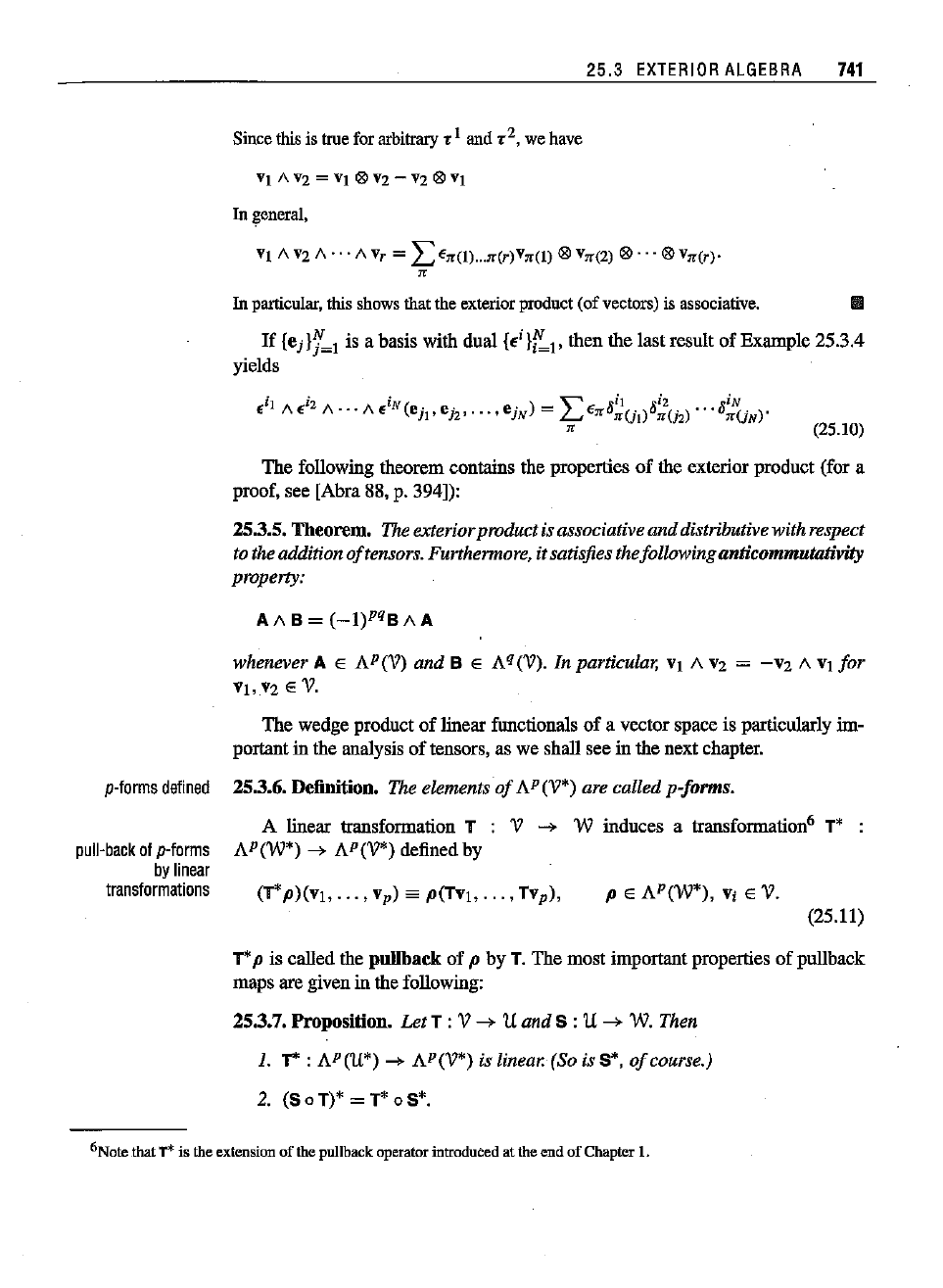
25.3
EXTERIOR
ALGEBRA
741
Sincethisis trueforarbitrary T
1
and
T
2
, wehave
In general,
vI
A
VZ
A
...
A Vr =
I:',,(l)
...
,,(r)
V,,(l) ® V,,(Z) ®
...
®
V,,(r)'
"
In particular, this shows that the exterior product
(of
vectors) is associative.
III
If {ejI7=1 is a basis with dual
{fil~l'
then the
lasiresult
of Exarnple 25.3.4
yields
(25.10)
p-forms
defined
pull-back
of
p-forms
by
linear
transformations
The following theorem contains the properties
of
the exterior product (for a
proof, see [Abra 88, p. 394]):
25.3.5.
Theorem.
The exteriorproductis associative
and
distributive withrespect
to the addition
of
tensors. Furthermore, itsatisfiesthefollowinganticommutativity
property:
whenever
A E AP (V) and B E Aq (V). In particular, VI A Vz =
-Vz
A VI
for
VI,VZ
E
V.
The wedge product
of
linear functiouals
of
a vector space is particularly im-
portantin the analysis of tensors, as we shall see in the next chapter.
25.3.6. Definition.
The elements
of
AP(V*) are called p-forms.
A linear transformation T ; V
~
W induces a transformation'' T*
AP(W*)
~
AP(V*) defined by
P E
AP(W*),
Vi E V.
(25.11)
T*P is called the
pullback
of p by T. The most important properties of pullback
maps are given in the following:
25.3.7. Proposition.
Let
T : V
~
U
and
S : U
~
W. Then
I.
T*
: AP(U*)
~
AP(V*)
is linear. (So is S*,
of
course.)
2. (S 0 T)* = T* 0 So.
6
Note
that T*is the extension
of
the pullback operator introduced at the
end
of
Chapter 1.
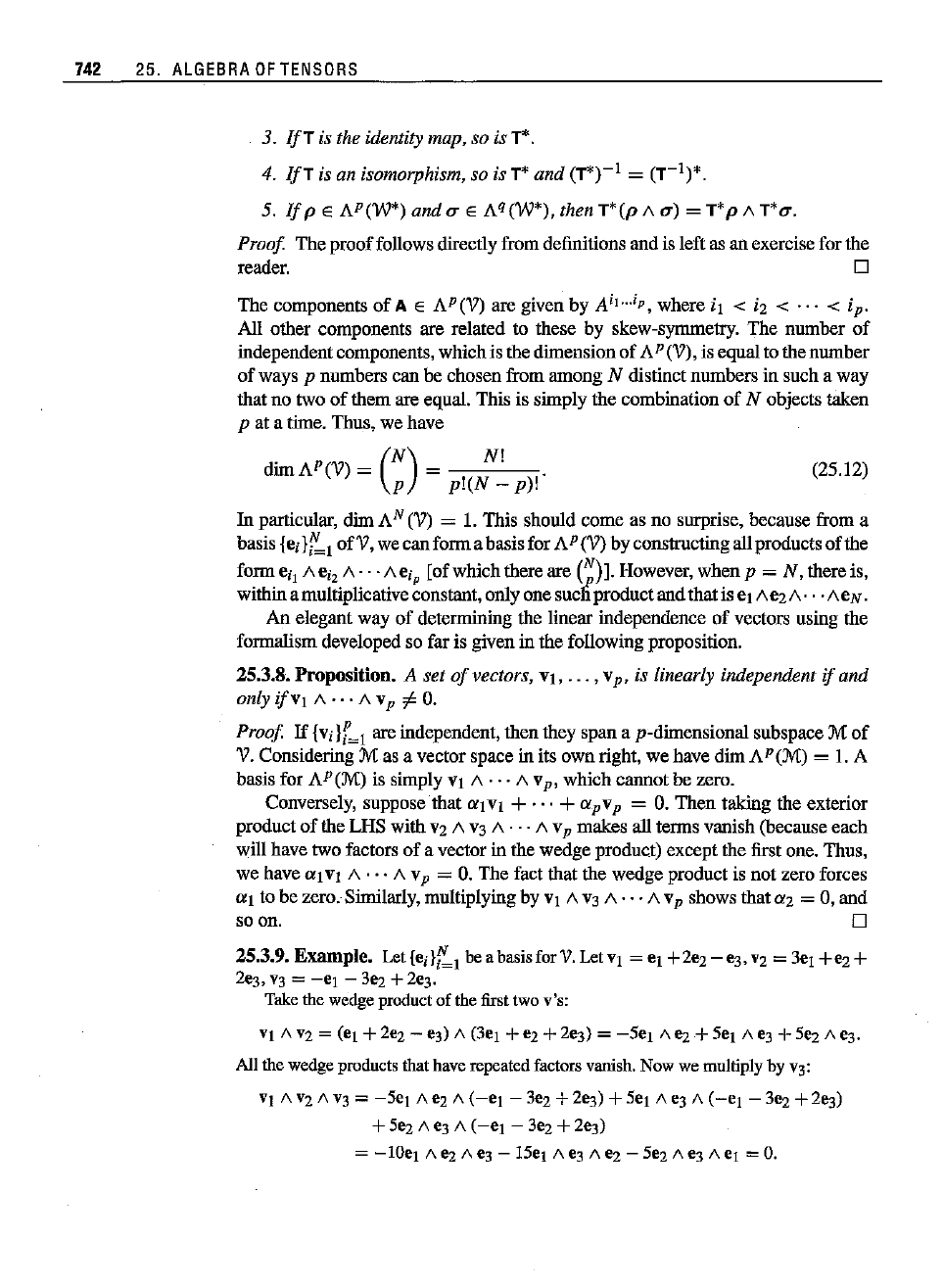
(25.12)
742 25.
ALGEBRA
OF
TENSORS
3.
1fT
is the identity map, so is T*.
4.
1fT
is an isomorphism, so is T* and
(T*)-l
=
(T-
1)*.
5.
If
P E AP(W*) and
0-
E Aq(W*), then T*(p A 0") = T*p A
T*o-.
Proof The
proof
follows directly from definitions and is left as an exercise for the
reader.
D
The components
of
A E AP(V) are given by Ai,...i
p
,
where i1 < i2 <
...
< i
p
•
All other components are related to these by skew-symmetry.
The
number
of
independentcomponents, whichis the dimension
of
AP (V), is equalto the number
of
ways p numbers can be chosen from among N distinct numbers in such a way
that no two
of
them are equal. This is simply the combination
of
N objects taken
p at a time. Thus, we have
dim
AP(V) =
(N)
= N! .
P
p!(N
- p)!
In
particular, dim
AN
(V) = 1.This should
come
as no surprise, because from a
basis
{eil!:l
of
V,we can forma basisfor AP(V)by constructingall products
of
the
Iorme.,
Aei2
A··
·Aeip
[of
whichthere are
(~)].
However,
whenp
= N,
thereis,
withinamultiplicativeconstant, onlyone suchproductand thatis
ei
Ae2A·
..
AeN.
An elegant way
of
determining the linear independence
of
vectors using the
formalism developed so far is given in the following proposition.
25.3.8.
Proposition.
A set
of
vectors, VI,
...
, v
p,
is linearly independent ifand
only
ifVI A
..
· A v
p
01
o.
Proof
If
{Vi J;=l are independent, then they span a p-dimensional subspace M
of
V. Considering M as a vector space in its
own
right, we have
dim
AP
(M)
= 1. A
basis for
AP(M)
is simply VI A
...
A v
p
,
which
cannot
be zero.
Conversely, suppose that "'1VI
+...+
"'p
vP = O.
Then
taking the exterior
prodnct
of
the LHS with
V2
A
V3
A
...
A vP makes all terms vanish (because
each
will have two factors
of
a vector in the wedge product) except the first one. Thns,
we have "'1VI A
...
A vP = O.The fact that the wedge product is
not
zero forces
"'1 to be zero. Similarly, mnltiplying by VI A
V3
A
...
AvP shows that "'2 = 0, and
00=
D
25.3.9.
Example.
Let{eil!:l
be abasisfor V.Let vI =ei +202 - e3.
V2
=3e1
+e2
+
2e3,v3
=
-e1
- 3e2+ 2e3.
Take
thewedge
product
of thefirsttwo v's:
VI
A
V2
= (e1+ 2e2- e3) A
(3e1
+ ez + 2e3) =
-5e1
Ae2 + 5e1 Ae3+ 5e2Ae3.
All
the
wedge
products
that
have
repeated
factors
vanish.
Nowwe
multiply
byv3:
VI
AV2 AV3
=-5e1 Ae2 A
(-e1
- 3e2
+2e3)
+5e1
Ae3 A
(-e1
- 3e2
+2e3)
+ 5e2Ae3 A
(-e1
- 3e2+ 2e3)
=
-WeI
A eZA e3 -
15el
A e3 1\ eZ - 5eZ A e3 A
et
=O.
